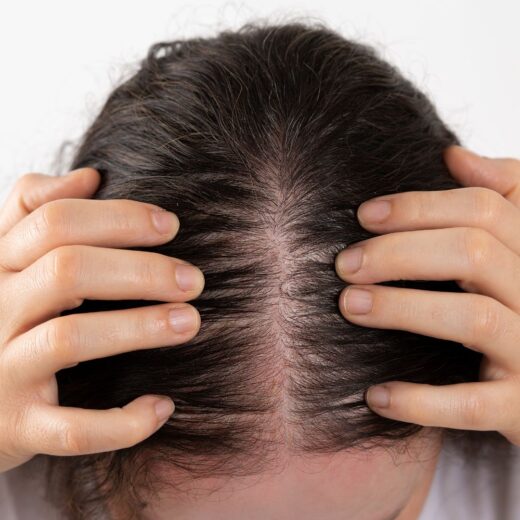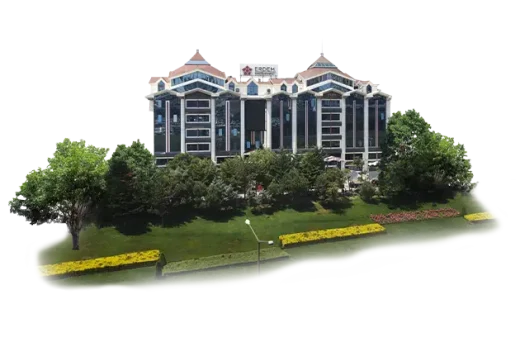Polycystic Ovary Syndrome (PCOS) is a common hormonal disorder that affects millions of women globally. One of its more distressing symptoms is hair thinning and loss. However, there are various treatment options and natural remedies available to manage and slow down this condition. This guide will explore the link between PCOS and hair loss, at-home strategies to support hair health, and professional treatments that can help restore hair growth.

Why Does PCOS Lead to Hair Loss?
PCOS-related hair loss, often referred to as androgenic alopecia, is primarily caused by hormonal imbalances. Women with PCOS tend to have elevated levels of androgens—male hormones such as testosterone—which can shrink hair follicles, resulting in progressive thinning, particularly around the crown and temples.
Additional factors such as chronic stress, nutritional deficiencies, and systemic inflammation can worsen hair loss in women with PCOS. Since PCOS-related hair thinning is usually gradual, seeking early treatment can help slow the process and improve hair density over time.
If you have noticed increased shedding, bald patches, or thinning hair, consulting with a professional clinic specializing in hair restoration can provide access to advanced treatments to manage the condition effectively.
Medical Treatments for PCOS-Related Hair Loss
To combat PCOS-induced hair loss, specialized treatments are available that address hormonal imbalances and stimulate hair growth. Some of the most effective medical interventions include:
DHT Blocker Therapy
Dihydrotestosterone (DHT) is a hormone that contributes to hair thinning and baldness. DHT-blocking mesotherapy helps inhibit the enzyme 5-alpha reductase, which converts testosterone into DHT. This treatment prevents further follicle shrinkage and supports the regrowth of healthy hair when combined with additional hair-stimulating therapies.
Scalp Mesotherapy
This minimally invasive procedure involves injecting a mix of vitamins, amino acids, and minerals directly into the scalp to nourish hair follicles and promote hair growth. It is especially beneficial for treating nutrient deficiencies that may contribute to hair thinning.
Growth Factor Therapy
Treatments like Platelet-Rich Plasma (PRP) and Plasma-Rich Fibrin (PRF) harness growth factors from your own blood to enhance tissue healing and stimulate new hair growth. These regenerative techniques encourage follicles to become more active and improve hair density over time.
Exosome Therapy
A cutting-edge approach, exosome therapy uses cellular messengers to activate dormant hair follicles and promote regrowth. This advanced regenerative treatment can enhance hair thickness and scalp health.
Alopecia Injections
These specialized injections are designed to address localized hair loss caused by alopecia areata. They contain anti-inflammatory and growth-stimulating compounds that help restore follicular health and encourage hair regrowth.
DHI Hair Transplantation
For women experiencing severe hair loss due to PCOS and female pattern baldness, Direct Hair Implantation (DHI) offers a highly effective solution. This technique allows for the precise extraction and implantation of hair follicles, delivering natural-looking results with minimal scarring.
Each treatment plan is customized based on individual needs, ensuring a holistic approach to tackling PCOS-related hair loss while promoting hair restoration.
Home Remedies to Manage PCOS Hair Loss

In addition to professional treatments, several home remedies can help support hair health and potentially slow hair loss progression. While these methods are not as powerful as clinical interventions, they can complement a comprehensive treatment plan:
Nutrient-Dense Diet
Consuming foods rich in essential vitamins and minerals, such as biotin, zinc, and iron, can support hair follicle health. Incorporate nutrient-packed foods like leafy greens, eggs, fish, and nuts into your daily meals to strengthen your hair from within.
Herbal Supplements
Certain herbs, such as saw palmetto and spearmint tea, have been linked to lowering androgen levels in women with PCOS. Before introducing any supplements into your routine, consult with a healthcare professional to ensure their safety and effectiveness for your condition.
Scalp Massage with Essential Oils
Regular scalp massages using essential oils like rosemary or lavender can improve blood circulation to hair follicles and help sustain hair growth. These oils have been traditionally used to support scalp health and maintain follicular activity.
Managing Stress Levels
Stress exacerbates hormonal imbalances and can worsen hair loss. Engaging in relaxation techniques such as meditation, yoga, and deep breathing exercises can aid in hormone regulation and support overall well-being.
Support & Expert Guidance for PCOS Hair Loss
Dealing with PCOS-related hair loss can feel overwhelming, but you don’t have to go through it alone. Hair restoration clinics provide specialized support for women dealing with hormonal hair thinning. Many offer scalp analysis, customized treatment plans, and holistic care approaches tailored to each individual’s needs.
Some clinics provide flexible payment options, allowing patients to access hair restoration treatments affordably. If you are unsure where to begin, online consultations can be a great first step toward finding the right solution for you.
Why Choose Erdem Hospital for PCOS-Related Hair Loss Treatment?

Erdem Hospital is a trusted healthcare institution offering advanced and effective solutions for PCOS-related hair loss. Here’s why you should choose Erdem Hospital for your hair restoration journey:
✔ Expert Dermatologists & Trichologists – Our highly experienced specialists understand the complexities of PCOS-related hair loss and provide tailored treatment solutions.
✔ Cutting-Edge Hair Restoration Treatments – From DHT blocker therapy, scalp mesotherapy, PRP treatments, to DHI hair transplantation, we offer the latest medical advancements to stimulate hair regrowth.
✔ Personalized Treatment Plans – Every patient receives a customized approach based on their hair loss pattern, lifestyle, and specific needs to achieve the best results.
✔ State-of-the-Art Facilities – Our hospital is equipped with modern technology, ensuring precise and effective treatments in a safe and comfortable environment.
✔ Holistic Approach to Hair Health – We don’t just treat hair loss; we focus on addressing the root cause, offering dietary guidance, stress management support, and hormone-balancing solutions.
✔ Affordable & Flexible Payment Plans – We believe that high-quality hair restoration should be accessible to everyone. Our budget-friendly payment options make it easier to get the care you need.
Regain your confidence with expert care at Erdem Hospital. Book your consultation today and take the first step towards healthier, fuller hair! For more just contact with us!
Frequently Asked Questions (FAQs)
How can I determine if my hair loss is caused by PCOS?
PCOS-related hair loss usually presents as thinning hair around the temples and crown rather than complete baldness. If you have been diagnosed with PCOS and notice gradual hair thinning, it is likely related to your condition. Consulting a hair specialist can provide a more accurate diagnosis through scalp analysis.
What is the most effective treatment for PCOS-related hair loss?
There is no universal solution for PCOS-induced hair thinning. However, treatments such as mesotherapy, growth factor therapy, and exosome therapy have shown promising results. For those experiencing significant hair loss, DHI hair transplantation may be the most effective option. A hair specialist can help determine the best treatment plan based on your specific condition.
How long does it take to see results from hair loss treatments?
Results vary depending on the treatment used and individual hair growth cycles. Most patients start noticing improvements within three to six months as follicles regain strength. Therapies like PRF and mesotherapy can yield early signs of regrowth, while hair transplants may take up to a year for full results.
Can home remedies reverse PCOS-related hair loss?
While a healthy diet, scalp massages, and herbal supplements can improve hair health, they are unlikely to fully reverse severe hair loss. Professional treatments are typically more effective in restoring lost hair. If you are experiencing significant thinning, consider seeking clinical solutions for the best outcomes.
Is DHI hair transplantation a painful procedure?
DHI hair transplantation is a minimally invasive technique performed under local anesthesia, making it a comfortable experience for most patients. It is specifically recommended for those with long-term hair thinning caused by PCOS or female pattern baldness. Most individuals report only mild discomfort during the procedure and a quick recovery period.
Final Thoughts
PCOS-related hair loss is a challenging but manageable condition. By addressing the root hormonal imbalances and implementing targeted treatments, you can slow hair thinning and improve overall scalp health. Whether through advanced clinical treatments or natural home remedies, taking proactive steps can significantly impact hair restoration and self-confidence.
If you are struggling with PCOS-related hair loss, consider seeking professional guidance for a customized treatment plan. Early intervention can make a significant difference in restoring hair growth and preventing further thinning.